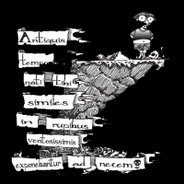Free Book Distribution, Podcasting, And Thou
James Palmer here with another article cum rant about writing.
A couple of things conspired inside my head for today's article. First off, I was listening to Mur Lafferty's I Should Be Writing podcast, where she interviewed a guy named Matthew Wayne Selznick, who self-published his novel Brave Men Run at Lulu.com and did it as podiobook.
Secondly, I read an article in last week's DM News, which I keep up with because I'm a copywriter, about a new plan by Google to offer free online public domain books. Science fiction author Cory Doctorow is mentioned in the article, and explains how he offers free electronic downloads of all of his works, and it doesn't impact sales.
Now, on to my point. I'm still a bit leary over giving away your stuff for free and not going the traditional publishing route, and I think newby authors should be as well. Here's why.
Selznick was telling Mur about how many times his book has been downloaded and how people have left him money in Podiobooks' online tip jar. Doctorow talked about how over 750,000 copies of his books were downloaded, and that these free downloads didn't effect sales of the printed books, and so on and so forth.
But don't you think it's more likely that those 750,000 downloads are more a result of them being for free and easy to snag? Maybe not in Doctorow's case, as the man has a well-established track record for putting out entertaining fiction. But what about all these first-time podiobook authors? How many hundreds of thousands of free-loaders have to download their work before they find the few dozen honest individuals who will actually throw a couple of bucks their way?
Speaking only for myself, I downloaded Doctorow's Down and Out in the Magic Kingdom because I wanted to read it AND it was free. But I never got past chapter four. See, I have other things to do when I'm at the computer, like write my own gibberish. I don't have time to sit and read pages and pages of .pdf text. And there aren't any really good, inexpensive ebook readers yet. At least I listen to podcasts, but only because I have an audio jack in my car where I can listen on the way to the day job.
If there's a bright side to any of this alternative to traditional publishing stuff, it's in giving people other options. Selznick's book existing simultaneously as a printed book, an audio cd, and an .mp3 file will open it up to more than one audience. Even in science fiction, you've got people who will never adapt to .mp3's and the like, so for them, a print book is the only way they will ever know you exist.
Perhaps another bright side is the publishing industry's acceptance of this, allowing authors like Cory Doctorow and Charles Stross to offer their books free of charge before they've even been published, under a Creative Commons license. After all, an industry with huge overhead caused by printing, storing, and distributing books that will go out of print inside a year, and a marketing machine that only promotes your work if you're already selling Stephen King level numbers, it's nice for them to recognize their shortcomings and look at a new way of doing business. Unlike the music industry, who is trying desperately to keep control of a system so vile and corrupt it's what made consumers and musicians look for other alternatives in the first place, the publishing industry is helping these early adopters try something new.
In the end, it's basic niche marketing. Unlike print publishing, which is mass marketing, niche marketing gets your stuff only to the people who are most likely to buy. This is very important, especially in the science fiction field.
But, for myself and any newbie authors wanting to make it, traditional publishing still seems to be the best way to go. I'm all for online books, which would drive the price down and authors would make up the difference in volume, but if we give everything away for free, our work will have no value. The occasional seven bucks from a Paypal tip jar won't allow anyone to keep creating stuff for people to try to rip off.




1 comment:
I must say, I've been grumpily against the concept of Google books since they announced it ages ago. Mostly, because they haven't asked for a lot of permissions before putting things online.
Free books are fine. Free music is fine. Free short stories, audio thingummies, and what have you are fine. But it has to be author controlled.
I realize I've mentioned this before, but Baen's free sampler CD is a wonderful idea. I have one. It has several complete books on it (a LOT of them) and a couple complete audio books, things like that. I adore it. It was through that disc that I went out and bought all sorts of Baen books I wouldn't have bought otherwise.
I think the internet is a valuable and useful resource for writers, whether they give away short stories or novels or whatever. I think that Google took a step in the right direction, I just think they nailed a helluva speed bump first thing.
Post a Comment